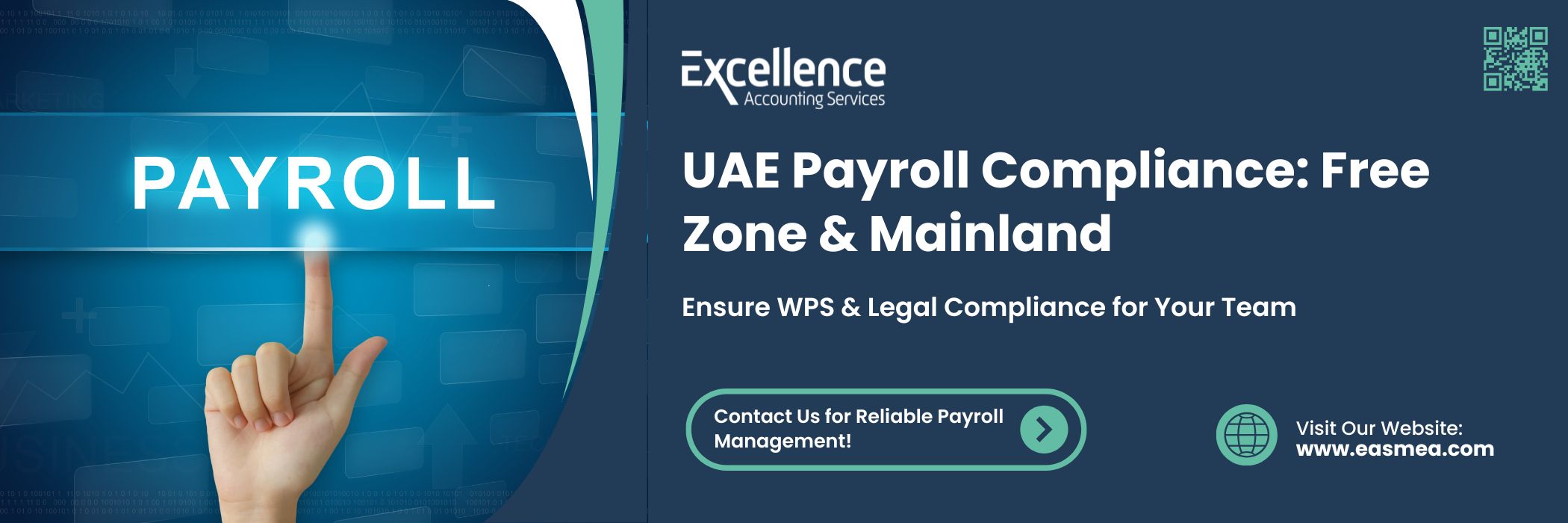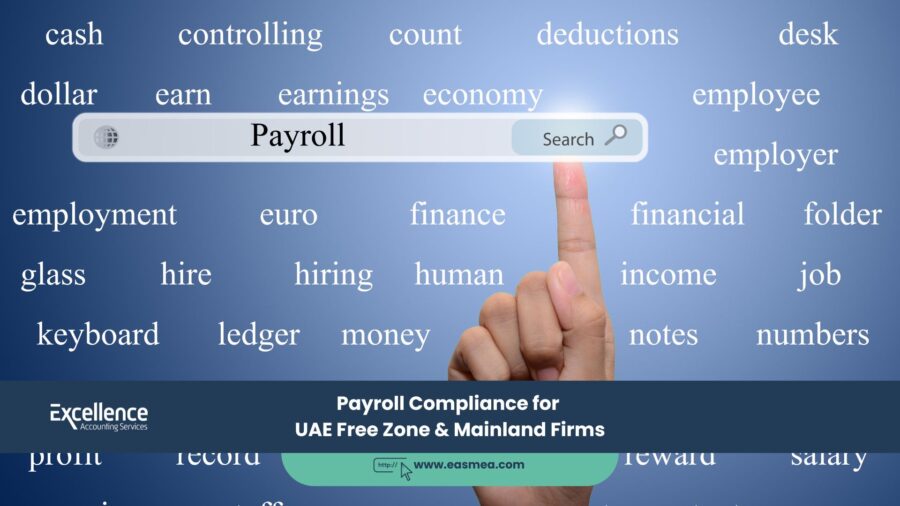Payroll compliance can be a complex yet crucial aspect of running a business in the UAE, whether in a Free Zone or Mainland. Understanding and adhering to the specific regulations is essential to avoid penalties and maintain smooth operations. This comprehensive guide will delve into the intricacies of payroll compliance in both Free Zone and Mainland companies, providing valuable insights and practical advice to ensure your business remains compliant. We’ll explore the key requirements, best practices, and available resources to help you navigate this critical area.
- Understanding the Legal Framework for Payroll Compliance in the UAE
- Implementing Effective Payroll Processes
- Payroll Compliance Reporting and Audits
- Best Practices for Payroll Compliance
- Common Payroll Compliance Challenges and Solutions
- What Excellence Accounting Services Can Offer
- FAQ: Payroll Compliance in the UAE
This blog post will cover everything from understanding the legal framework to implementing efficient payroll processes and staying updated with evolving regulations. We’ll also discuss the differences between Free Zone and Mainland payroll compliance, highlighting specific considerations for each. By the end of this guide, you’ll have a clear understanding of what payroll compliance entails and how to effectively manage it within your organization.
Furthermore, we will also explore the challenges businesses face, the importance of accurate record-keeping, and the role of technology in streamlining payroll processes. Whether you’re a seasoned business owner or just starting, this guide will provide you with the knowledge and tools you need to ensure your payroll practices are compliant and efficient.
Understanding the Legal Framework for Payroll Compliance in the UAE
Payroll compliance in the UAE is governed by several laws and regulations, which vary slightly between Free Zones and Mainland. Understanding these differences is crucial for businesses operating in either jurisdiction.
Key Regulations Governing Payroll in the UAE
The primary legislation governing payroll in the UAE includes the UAE Labour Law (Federal Decree-Law No. 47 of 2022), which applies to Mainland companies, and the specific regulations of each Free Zone authority. Additionally, other laws related to taxation (though corporate tax is recent, individual income tax is not present), social security (for UAE nationals), and employee rights also impact payroll compliance. For example, regulations related to working hours, overtime, and leave entitlements must be considered when calculating payroll.
Staying up-to-date with these regulations can be challenging, as they can be subject to change. Regularly consulting with legal and financial professionals is advisable to ensure ongoing compliance. Following official government announcements and subscribing to legal updates are also helpful strategies.

Free Zone vs. Mainland Payroll: Key Differences
While some fundamental principles apply to both, there are distinct differences between Free Zone and Mainland payroll compliance. Free Zones often have their own specific rules and regulations, while Mainland companies must adhere to the federal UAE Labour Law.
These differences can relate to contract types, end-of-service gratuity calculations, and even the application of the Wage Protection System (WPS).
| Feature | Free Zone | Mainland |
|---|---|---|
| Governing Law | Free Zone Authority Regulations (e.g., Dubai Airport Free Zone Authority regulations) | UAE Labour Law (Federal Decree-Law No. 47 of 2022) |
| Contract Types | More flexible, allowing for customized contracts | More structured, with specific requirements outlined in the Labour Law |
| End-of-Service Gratuity | Varies by Free Zone; some may have different calculation methods or rules | Defined by Labour Law; calculated based on length of service and last drawn basic salary |
| WPS Compliance | Often required, but variations exist in implementation and specific requirements between Free Zones | Mandatory for all Mainland companies; strict adherence to WPS regulations is essential |
| Visa Requirements | Free Zones handle visa processing; specific rules apply | Ministry of Human Resources and Emiratisation (MOHRE) governs visa processes |
Implementing Effective Payroll Processes
Establishing robust payroll processes is essential for ensuring accuracy and compliance. This involves several key steps, from data collection to salary disbursement and reporting.
Setting Up a Compliant Payroll System
Implementing a compliant payroll system requires careful planning and consideration of various factors, including the size of your workforce, the complexity of your payroll calculations (e.g., different salary structures, allowances, deductions), and your budget. For smaller businesses, a simple spreadsheet might suffice initially, but as the company grows, dedicated payroll software or a payroll service provider becomes essential.
Choosing the right payroll software or partnering with a reputable payroll service provider can significantly simplify this process. Consider factors like automation capabilities, reporting features, integration with other HR systems, and local compliance updates when selecting a solution.
Managing Employee Data and Records
Accurate record-keeping is a cornerstone of payroll compliance. Maintaining detailed records of employee information, salaries, deductions (for things like loan repayments or health insurance), and leave is essential for audits and reporting. This includes contracts, visa details, salary certificates, and proof of WPS payments.
Utilizing a secure and reliable HR and payroll system can automate data management and ensure easy access to information when needed. Regular backups of this data are also critical for business continuity.
Payroll Compliance Reporting and Audits
Regular reporting and occasional audits are part of the payroll compliance landscape in the UAE. Understanding the reporting requirements and preparing for audits is crucial for all businesses.
WPS Compliance and Reporting
The Wage Protection System (WPS) is a mandatory electronic salary transfer system in the UAE, designed to protect employee wages. Compliance with WPS regulations is essential for all businesses. It mandates that salaries are transferred directly to employees’ bank accounts through approved financial institutions.
Regularly submitting accurate wage information through the WPS platform is a key aspect of payroll compliance reporting. Any discrepancies or delays in salary payments can lead to penalties.
Preparing for Payroll Compliance Audits
Payroll compliance audits can be conducted by government authorities (e.g., MOHRE) or Free Zone authorities. Being prepared for these audits is essential to avoid penalties. Auditors will typically review payroll records, WPS compliance, employee contracts, and other relevant documentation.
Maintaining accurate records, implementing robust internal controls, and regularly reviewing your payroll processes can help you prepare for and successfully navigate audits. Conducting internal audits can also help identify and address any potential compliance gaps.
Best Practices for Payroll Compliance
Adhering to best practices can significantly enhance your payroll compliance efforts and minimize the risk of errors or penalties.
Staying Updated with Regulatory Changes
Payroll regulations are subject to change. Staying informed about these changes is crucial for maintaining compliance. Changes can arise from amendments to the Labour Law, updates to Free Zone regulations, or new directives from the Ministry of Human Resources and Emiratisation (MOHRE).
Subscribing to industry newsletters, attending seminars, and consulting with legal and financial professionals can help you stay up-to-date. Actively monitoring official government websites and publications is also essential.
Utilizing Technology for Payroll Management
Leveraging technology can streamline payroll processes, improve accuracy, and enhance compliance. Several payroll software solutions are available that cater to the specific needs of businesses in the UAE.
For instance, Zoho Payroll UAE simplifies payroll processing and helps businesses stay compliant with local regulations. Other options include cloud-based solutions like Xero or local providers.
| Feature | Manual Payroll | Automated Payroll (e.g., Zoho Payroll UAE) |
|---|---|---|
| Accuracy | Prone to errors due to manual data entry and calculations | Highly accurate due to automated calculations and validation checks |
| Efficiency | Time-consuming and labor-intensive, especially for larger workforces | Highly efficient, freeing up HR staff for other tasks |
| Compliance | Challenging to maintain, as manual processes increase the risk of errors and omissions | Easier to manage, with built-in compliance features and automated reporting |
| Cost | Can be deceptively costly due to time spent on manual tasks and potential penalties for errors | Often more cost-effective in the long run due to increased efficiency and reduced risk of penalties |
| Security | Data security can be a concern if using spreadsheets or manual systems | Reputable payroll software providers offer robust data security measures |
Common Payroll Compliance Challenges and Solutions
Businesses in the UAE often face various challenges related to payroll compliance. Understanding these challenges and implementing effective solutions is crucial.
Dealing with Complex Payroll Calculations
Calculating salaries, deductions, and end-of-service gratuity can be complex, especially for businesses with a diverse workforce. Factors like varying contract types, allowances, overtime, and different gratuity calculation methods can add to the complexity.
Utilizing payroll software or engaging a payroll service provider can simplify these calculations and ensure accuracy. These solutions often have built-in formulas and logic to handle complex calculations automatically.
Managing Employee Leave and Absences
Tracking employee leave and absences accurately is essential for payroll processing. Different types of leave (annual leave, sick leave, unpaid leave) have different entitlements and rules. Accurate tracking is essential for calculating leave pay and ensuring compliance with labor laws.
Implementing a robust leave management system, integrated with your payroll system, can automate this process and ensure compliance with labor laws. This also allows employees to easily request and track their leave.
What Excellence Accounting Services Can Offer
Excellence Accounting Services offers comprehensive payroll compliance services to businesses in the UAE. Our team of experienced professionals can assist you with:
- Payroll setup and implementation: Whether you’re a new business or looking to revamp your existing payroll system, we can guide you through the setup and implementation process. We’ll assess your requirements, recommend the most suitable payroll software or system, and configure it to align with your specific needs and the relevant regulations. This includes setting up employee profiles, defining salary structures, configuring deductions and allowances, and integrating with your accounting system.
- Payroll processing and reporting: We can handle your regular payroll processing, including salary calculations, deductions, and generating payslips. We’ll also ensure accurate and timely reporting to relevant authorities, including WPS compliance.
- WPS compliance: We can manage your WPS registration, salary uploads, and reconciliation, ensuring compliance with all WPS regulations and avoiding penalties.
- Payroll audits and advisory: We can assist you in preparing for payroll audits, conducting internal audits, and providing expert advice on payroll compliance best practices.
- Staying updated with regulatory changes: We continuously monitor changes in payroll regulations and update our processes accordingly, ensuring your business stays compliant.
- Customized solutions: We understand that every business is unique. We offer customized payroll solutions tailored to your specific industry, size, and requirements.
Cost-effectiveness: Outsourcing your payroll to us can be more cost-effective than managing it in-house, especially for smaller businesses. It can save you time, resources, and reduce the risk of costly errors.
- Confidentiality: We maintain strict confidentiality regarding your employee data and payroll information.
We can tailor our services to meet your specific needs and ensure your business remains compliant with all applicable regulations. Contact us for a consultation to discuss your requirements.
FAQ: Payroll Compliance in the UAE
Navigating the intricacies of payroll compliance in the UAE can be challenging. To help you better understand the key aspects, we’ve compiled a list of frequently asked questions. These answers provide detailed information and practical insights to ensure your business remains compliant and your employees are paid accurately and on time.
Payroll compliance encompasses adhering to all legal and regulatory requirements related to employee compensation. It’s more than just paying salaries; it involves accurately calculating wages, deductions, taxes (corporate tax implications), social security contributions (for UAE nationals), and other benefits. It also includes maintaining meticulous records, adhering to the Wage Protection System (WPS), and submitting timely reports to relevant authorities.
Essentially, payroll compliance ensures that employees are paid correctly and that businesses fulfill their legal obligations related to employment and compensation.
| Aspect of Payroll Compliance | Description | Importance |
|---|---|---|
| Accurate Calculations | Correctly calculating salaries, overtime, allowances, and deductions. | Prevents disputes and ensures fair compensation. |
| Record Keeping | Maintaining detailed records of employee information, salaries, and deductions. | Essential for audits and legal compliance. |
| WPS Compliance | Adhering to the Wage Protection System for electronic salary transfers. | Protects employee wages and ensures timely payments. |
| Reporting | Submitting accurate reports to government authorities. | Demonstrates compliance and avoids penalties. |
| Legal Updates | Staying informed and adapting to changes in labor laws and regulations. | Ensures ongoing compliance and avoids legal issues. |
Payroll compliance is not a one-time activity; it’s an ongoing process that requires constant attention and adaptation to evolving regulations. By prioritizing payroll compliance, businesses can avoid penalties, maintain a positive work environment, and focus on their core objectives.
Payroll compliance is paramount for several reasons, extending beyond simply avoiding legal repercussions. It’s a fundamental aspect of responsible business practice and contributes to a positive and productive work environment. Non-compliance can lead to severe consequences, including hefty fines, legal action, visa issues for the company and its employees, and significant reputational damage.
Beyond the legal and financial risks, payroll compliance plays a crucial role in maintaining employee trust and satisfaction.
- Legal & Financial Risks: Non-compliance can result in substantial fines, legal battles, and even business closure in severe cases. The financial burden of penalties and legal fees can significantly impact a company’s bottom line.
- Reputational Damage: Negative publicity surrounding payroll non-compliance can tarnish a company’s reputation, making it difficult to attract and retain talent. Trust is essential in employer-employee relationships, and any breach of trust can have long-lasting consequences.
- Employee Morale: Accurate and timely payroll is crucial for employee morale. Errors or delays in salary payments can lead to dissatisfaction, decreased productivity, and high employee turnover.
- Ethical Considerations: Payroll compliance demonstrates a commitment to ethical business practices and fair treatment of employees. It shows that the company values its employees and respects their rights.
In conclusion, payroll compliance is not just a legal requirement; it’s an ethical and business imperative. It’s an investment in your company’s future and a demonstration of your commitment to your employees.
Payroll in the UAE is governed by a complex web of laws and regulations, which can vary depending on whether your business operates in a Mainland or Free Zone. Understanding these regulations is crucial for ensuring compliance.
The primary legislation is the UAE Labour Law (Federal Decree-Law No. 47 of 2022), which applies to Mainland companies. Free Zones, on the other hand, have their own specific regulations, which can differ significantly between each zone.
| Governing Body | Applicable Regulations | Key Considerations |
|---|---|---|
| Mainland Companies | UAE Labour Law (Federal Decree-Law No. 47 of 2022) | Covers various aspects of employment, including contracts, working hours, leave, and end-of-service gratuity. |
| Free Zone Companies | Specific Free Zone Authority Regulations | Each Free Zone has its own set of rules, which may differ from the Labour Law. |
| All Companies | Other relevant laws and regulations | These include laws related to corporate tax, social security (for UAE nationals), and other employment-related matters. |
It’s important to note that these regulations are subject to change, so staying updated is essential. Consulting with legal and financial professionals is highly recommended to ensure your payroll practices align with the latest laws and regulations.
The Wage Protection System (WPS) is a crucial initiative by the UAE government to protect employee wages and ensure timely payments. It’s a mandatory electronic salary transfer system that requires employers to pay their employees through approved banks and financial institutions within the UAE. The WPS aims to enhance transparency in salary payments and prevent wage disputes.
- How it works: Employers must transfer salaries directly to employees’ bank accounts through the WPS system. This provides a clear and auditable record of salary payments.
- Benefits: The WPS protects employees from delayed or unpaid wages, promotes transparency, and reduces the risk of labor disputes.
- Compliance: Compliance with WPS regulations is mandatory for all businesses in the UAE. Failure to comply can result in penalties, including fines and legal action.
The WPS is a critical component of payroll compliance in the UAE. It ensures that employees receive their due wages promptly and that businesses adhere to ethical and legal standards.
Ensuring payroll compliance requires a multifaceted approach, encompassing robust processes, accurate record-keeping, and continuous monitoring of regulatory changes. Here’s a breakdown of key steps:
- Establish Robust Payroll Processes: Implement clear and well-documented payroll procedures, covering all aspects of salary calculations, deductions, and reporting.
- Maintain Accurate Records: Keep detailed and organized records of employee information, contracts, salary details, leave records, and other relevant documentation.
- Stay Updated: Stay informed about changes in labor laws, Free Zone regulations, and other relevant legislation. Subscribe to legal updates and consult with professionals.
- Utilize Technology: Leverage payroll software to automate calculations, generate reports, and ensure compliance with WPS and other regulations.
- Conduct Regular Audits: Perform internal audits to identify and address any potential compliance gaps. Consider external audits for an independent assessment.
- Seek Professional Advice: Consult with legal and financial professionals for expert guidance on payroll compliance best practices.
By taking these steps, businesses can significantly reduce the risk of payroll errors and ensure ongoing compliance with UAE regulations.
Non-compliance with payroll regulations in the UAE can lead to a range of penalties, varying in severity depending on the nature and extent of the violation. These penalties can have significant financial and reputational consequences for businesses.
| Type of Violation | Potential Penalties |
|---|---|
| Failure to comply with WPS | Fines per employee, suspension from WPS, and potential legal action. |
| Inaccurate payroll records | Fines, legal action, and damage to reputation. |
| Non-compliance with Labour Law | Fines, legal action, and potential visa issues. |
| Violations of Free Zone regulations | Fines, suspension of business license, and other penalties. |
It’s crucial to understand that penalties can be cumulative, and repeated violations can lead to more severe consequences. Maintaining strict payroll compliance is essential to avoid these penalties and protect your business.
Yes, Free Zones operate under their own specific regulations, which can differ significantly from the federal UAE Labour Law that governs Mainland companies. Each Free Zone authority has its own set of rules regarding employment contracts, working hours, leave entitlements, end-of-service gratuity, and other payroll-related matters.
| Feature | Mainland Companies | Free Zone Companies |
|---|---|---|
| Governing Law | UAE Labour Law | Specific Free Zone Authority Regulations |
| Contract Types | More structured and regulated | Can be more flexible and customized |
| End-of-Service Gratuity | Specific calculation methods defined by Labour Law | May have different calculation methods or rules |
| WPS Implementation | Mandatory and strictly enforced | Often required, but implementation can vary |
Businesses operating in Free Zones must carefully review and adhere to the specific regulations of their respective Free Zone authority. It’s crucial to understand these differences to ensure compliance.
Regularly reviewing your payroll processes is essential for maintaining compliance and identifying areas for improvement. The frequency of reviews depends on various factors, such as the size of your business, the complexity of your payroll, and the frequency of regulatory changes.
- Recommended Frequency: At a minimum, businesses should conduct a thorough review of their payroll processes annually.
- More Frequent Reviews: More frequent reviews, such as quarterly or even monthly, may be necessary if there are significant changes in regulations or if the business experiences rapid growth or restructuring.
- Trigger Events: Any changes in labor laws, Free Zone regulations, or company policies should trigger a review of payroll processes to ensure alignment.
Regular payroll reviews help identify potential compliance gaps, improve efficiency, and ensure that your payroll practices are up to date.
Technology plays a vital role in streamlining payroll processes, enhancing accuracy, and ensuring compliance. Payroll software and other technological tools can automate many aspects of payroll management, reducing the risk of errors and freeing up HR staff for other strategic tasks.
- Automation: Payroll software automates calculations, deductions, and report generation, minimizing manual data entry and reducing the potential for human error.
- Accuracy: Automated calculations and built-in validation checks ensure greater accuracy in payroll processing.
- Compliance: Many payroll systems are designed with built-in compliance features, helping businesses adhere to WPS regulations, tax requirements, and other legal obligations.
- Efficiency: Technology streamlines payroll processes, saving time and resources. It allows for faster processing, reporting, and data management.
- Data Security: Reputable payroll software providers offer robust data security measures to protect sensitive employee information.
By leveraging technology, businesses can significantly improve the efficiency and accuracy of their payroll processes while ensuring compliance with relevant regulations.
Finding reliable and up-to-date information about payroll compliance is crucial for businesses operating in the UAE. Here are some trusted sources:
- Ministry of Human Resources and Emiratisation (MOHRE) Website: The official MOHRE website is a primary source for information on UAE labor laws and regulations.
- Free Zone Authority Websites: Each Free Zone authority has its own website with specific regulations and guidelines for businesses operating within its jurisdiction.
- Legal and Financial Professionals: Consulting with legal and financial professionals specializing in UAE labor law and payroll compliance is highly recommended.
- Reputable Payroll Service Providers: Reputable payroll service providers, like Excellence Accounting Services, often provide valuable resources and updates on payroll compliance.
- Industry Associations: Industry associations and business groups may offer resources and seminars on payroll compliance.
Staying informed about payroll regulations is an ongoing process. Regularly consulting these resources and seeking professional advice will help your business maintain compliance and avoid potential penalties.
Lorem ipsum dolor sit amet, consectetur adipiscing elit. Ut elit tellus, luctus nec ullamcorper mattis, pulvinar dapibus leo.




